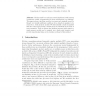Free Online Productivity Tools
i2Speak
i2Symbol
i2OCR
iTex2Img
iWeb2Print
iWeb2Shot
i2Type
iPdf2Split
iPdf2Merge
i2Bopomofo
i2Arabic
i2Style
i2Image
i2PDF
iLatex2Rtf
Sci2ools
136
click to vote
APLAS
2011
ACM
2011
ACM
Soundness of Data Flow Analyses for Weak Memory Models
Modern multi-core microprocessors implement weak memory consistency models; programming for these architectures is a challenge. This paper solves a problem open for ten years, and originally posed by Rinard: we identify sufficient conditions for a data flow analysis to be sound w.r.t. weak memory models. We first identify a class of analyses that are sound, and provide a formal proof of soundness at the level of trace semantics. Then we discuss how analyses unsound with respect to weak memory models can be repaired via a fixed point iteration, and provide experimental data on the runtime overhead of this method.
APLAS 2011 | Memory Consistency Models | Point Iteration | Programming Languages | Trace Semantics |
| Added | 12 Dec 2011 |
| Updated | 12 Dec 2011 |
| Type | Journal |
| Year | 2011 |
| Where | APLAS |
| Authors | Jade Alglave, Daniel Kroening, John Lugton, Vincent Nimal, Michael Tautschnig |
Comments (0)

